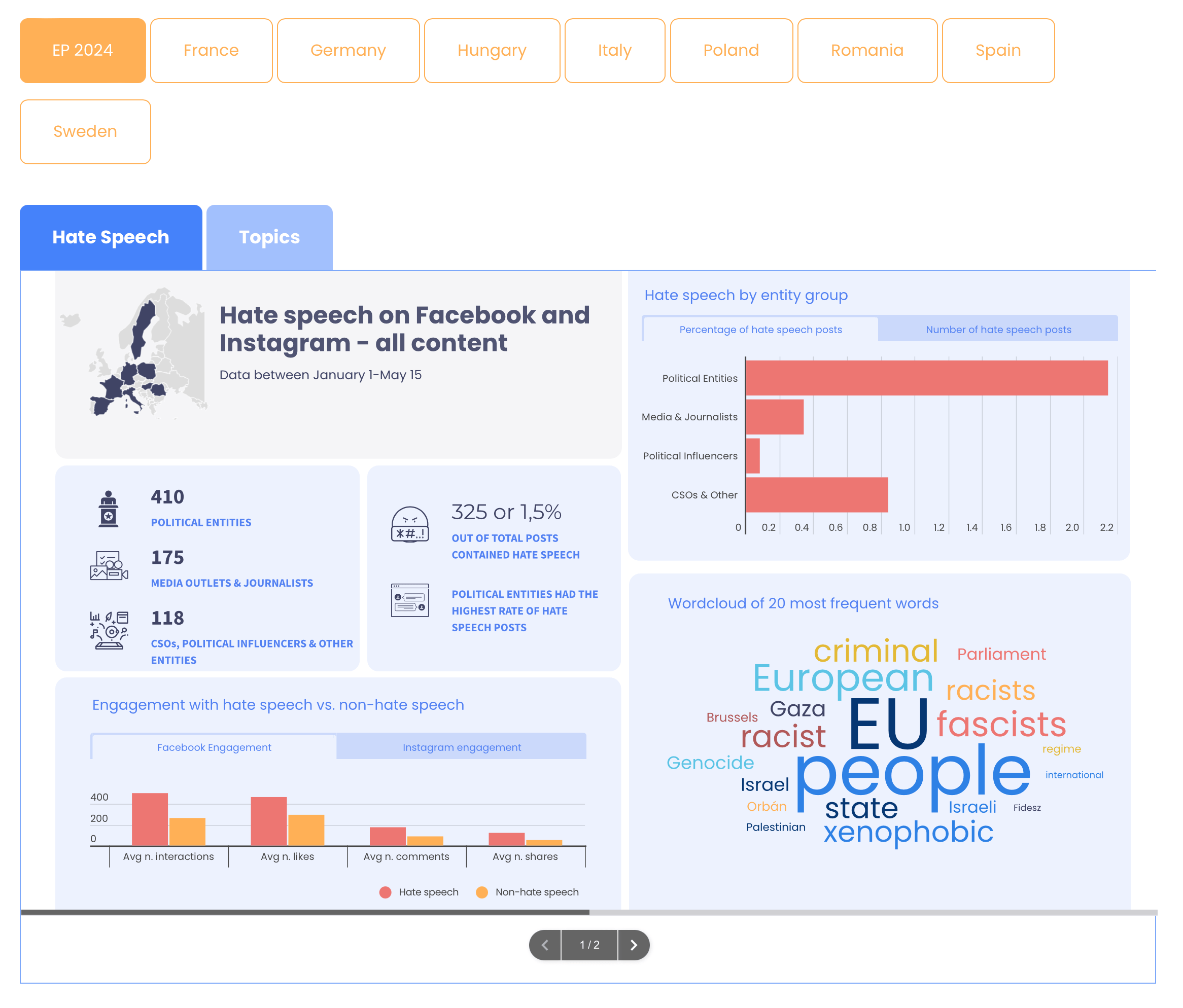In the world’s second-largest election, around 400 million EU citizens headed to the polls between 6-9 June. The elections shaped a new European Parliament, a directly elected institution playing a crucial role in shaping the European Union at a pivotal moment.
With the EU facing significant challenges, ranging from heightened security threats to inflation, and seizing important opportunities like the green transition, European society is undergoing profound shifts that are reflected in both European politics and online debates.
In this context, Democracy Reporting International monitored social media ahead of these critical European elections to identify general trends and topics in online debates happening across the bloc. Our research also highlighted country-specific examples of hate speech, disinformation, and potential information manipulation.
We did not do this alone. We enlisted the help of eight researchers who make up our Social Media Monitoring Hub. Each researcher is tasked with monitoring the online discourse in one of eight key EU member states: France, Germany, Spain, Poland, Hungary, Italy, Sweden, and Romania. As part of the project, the researchers analysed public posts from political parties, leaders, media, and public figures across Facebook, Instagram, X and TikTok.
Social Media Monitoring Dashboard
Our social media dashboard compiles data from our monitoring into a single, user-friendly interface that reveals findings on topics such as hate speech, its key contributors, main narratives, and in-depth analyses of specific issues.
Research findings
Are Chatbots Misinforming Us About the European Elections? Yes.
After asking four chatbots ten questions in ten different languages (a total of 400 questions), DRI revealed that chatbots are less reliable than search engines in providing users with electoral information. We asked ChatGPT 3.5 & 4, CoPilot and Gemini common questions about the European elections and all of them provided some totally or partially incorrect answers. This research brief was covered by Politico and Euronews, as well as other outlets.
When Misinformation Becomes Disinformation: Chatbot Companies and EU Elections
Weeks before publishing the study above and having made our findings available to the chatbot companies, we once again asked the chatbot five questions in 10 different languages. In this second study, we examine the degree to which these companies adapted their chatbots to address the problems revealed in the first study. The most notable change was Google’s Gemini, which refused to respond to our questions on the electoral process. We consider this a responsible approach to preventing disinformation on chatbots. Microsoft’s Copilot sometimes refused to reply but displayed a high rate of incorrect responses. Both versions of OpenAI’s ChatGPT displayed a concerning rate of errors and rarely refused to provide users with answers. The study was covered by Euronews.
Inauthentic Behaviour on TikTok – Concerning Accounts Supporting the AfD and Rassemblement National
DRI identified a number of highly active accounts on TikTok exhibiting inauthentic behaviour and supporting the far-right parties AfD and Rassemblement National. TikTok’s inaction towards those accounts goes against the social network’s own community standards and current EU regulations. DRI made this information available to TikTok.
Disinformation Concern: Inauthentic TikTok Accounts that Support Political Parties
In a follow-up to the research brief above, DRI found that while TikTok cancelled five of the accounts we flagged many others remained in place. The social media network did not seem to do a systematic verification of inauthentic accounts beyond the ones identified by DRI. Overall, TikTok seems to have allowed murky accounts with unclear affiliations and questioned authenticity to distribute political content to millions of viewers during the EU elections campaign.
TikTok accounts with unclear affiliation supporting political parties and political candidates in the EU
In a third analysis of TikTok posts during the campaign, we once again found numerous accounts with vague self-descriptions, using party/candidate names, logos, symbols, or photos. These sorts of impersonations are against TikTok’s community guidelines. We once again invite TikTok to conduct a systematic review of such posts, which have a negative effect on civil discourse during the elections and beyond.
From Engagement to Enmity: Toxicity and Key Narratives in EP Elections 2024
Our social media monitoring of key political accounts on Facebook and Instagram in the run-up to the European elections revealed a low level of online toxicity. While the percentage of toxic posts was low, those that included inflammatory language received more user engagement than positive or neutral posts. If we look at countries, Hungary and Poland saw a higher volume of toxic posts, while Italy had the lowest.
Unveiling the Surface: A Snapshot from Political Content on German Public WhatsApp Groups
Thanks to Palver, we were able to access a sample of 334 WhatsApp public groups in Germany to understand the country’s political conversation on this channel during the EU election campaign. We revealed that WhatsApp’s communities are mainly being used to distribute links to other social media posts and that messages in the channel had a strong focus on security and the role of migrants in crime. Most messages also referred to the German far-right party, AfD, as a solution to many of society’s problems, including security and migration.
AfD v. RN: A Comparative Analysis of Far-Right Political Campaigning on X
Over the past year, X (formerly Twitter) has undergone significant changes, making it a more enabling environment for the far-right to campaign. During the campaign for the EU elections, we examined how France’s National Rally and Germany’s Alternative Für Deutschland campaigned on the platform. Both parties heavily focused on immigration and crime, making these issues central to their campaigns.
Selected media coverage
POLITICO EUROPE — AI chatbots spread falsehoods about the EU election, report finds
Euronews — Chatbots providing ‘unintentional’ misinformation ahead of EU election
Euronews — AI chatbots intentionally spreading election-related disinformation, study finds
Süddeutsche Zeitung — What about disinformation in the European elections? (in German)
This work was made possible with the financial support of Stiftung Mercator, Culture of Solidarity Fund, Kofi Annan Foundation, Foundation for European Progressive Studies, Friedrich-Ebert Foundation
